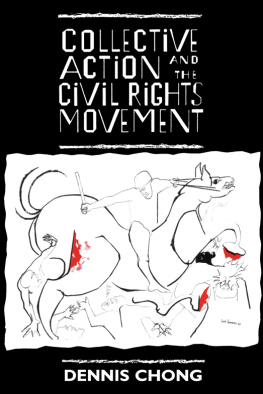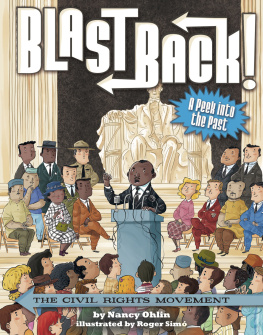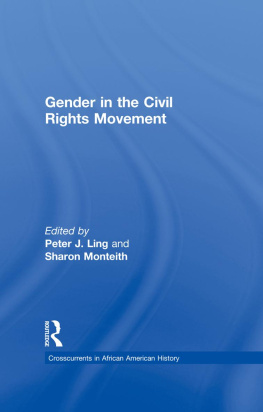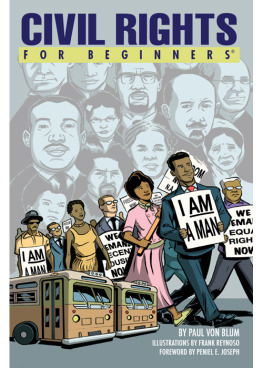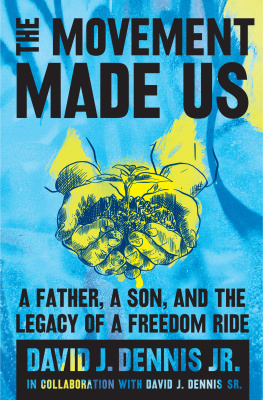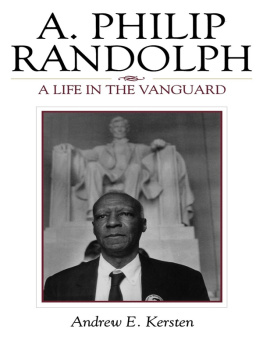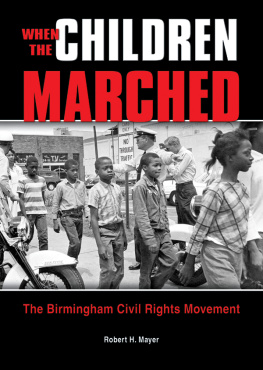A MERICAN P OLITICS AND P OLITICAL E CONOMY S ERIES
Edited by Benjamin I. Page
The University of Chicago Press, Chicago 60637
The University of Chicago Press, Ltd., London
1991 by The University of Chicago
All rights reserved. Published 1991
Printed in the United States of America
09 08 07 06 05 04 03 02 01 00 4 5 6 7 8
ISBN-13: 978-0-226-22869-3 (e-book)
Library of Congress Cataloging in Publications Data
Chong, Dennis.
Collective action and the civil rights movement / Dennis Chong.
p. cm.(American politics and political economy series)
Includes bibliographical references and index.
ISBN 0-226-10440-0 (alk. paper).ISBN 0-226-10441-9 (pbk.)
1. Public goods. 2. Social choice. 3. Civil rights movementsUnited States. I. Title. II. Series: American politics and political economy.
HB846.5.C48 1991
323.1 196073dc20 | 90-48848 CIP |

The paper used in this publication meets the minimum requirements of the American National Standard for Information SciencesPermanence of Paper for Printed Library Materials, ANSI Z39.481992.
For M & G, J & B
Contents
. The Prisoners Dilemma
. Collective Action as a Prisoners Dilemma
. The All-Or-Nothing Game
. The Public Relations (PR) Game
. Payoffs in the Three-Person Prisoners Dilemma
. Private vs. Publicly Stated Preferences
. The Costs-Are-Benefits Model
. The Assurance Game
. (a)(c). Coordination Games
. The Lynch Mob
. N-Person Prisoners Dilemma
. N-Person Prisoners Dilemma
. N-Person Assurance Game
. N-Person Assurance Game
. An Assurance Game with Uncertainty
. Mobilization and Supply Move in Harmony But Without Limit
. Mobilization and Supply Fuel Each Other But Approach Equilibria
. Mobilization is Quashed by Strong Opposition
. Mobilization Dampens in the Face of Opposition
. Mobilization Climbs Without Bound Despite No Supply
. Mobilization Climbs Despite Unresponsive Authorities
. Mobilization Dampens or Collapses in the Absence of Supply
. Mobilization Increases Slowly with Weak Organization
. Mobilization Increases Rapidly with Strong Organization
. Mobilization Climbs Until Supply Equals Demand Generated Per Period
. Mobilization Plummets as Government Initiative And Responsiveness Increase
. Mobilization is Sustained by Constant New Demands
There is a famous paradox of Zenos in which Achilles races a tortoise. Since the tortoise is much slower than Achilles, it is given a big lead at the start of the race. Achilles tries to make up this handicap once the race begins, but in the time that it takes him to cover the initial distance separating them, the tortoise is able to crawl ahead to keep its lead. Alas, though the tortoise is slow, every time that Achilles catches up to where it used to be, it manages in the meantime to move beyond his reach. It seems that Achilles can never catch the tortoise.
I have felt occasionally that writing a book is a bit like being trapped in Zenos paradox. Through countless drafts and revisions, one inches towards the elusive goal of finishing. But it seems that the completion of one task merely leads to another, and that the end is always somewhere on the horizon. In the meantime, family and friends grow increasingly skeptical about this supposedly forthcoming book.
Fortunately, there is an end to the process just as there is a limit to how long the tortoise can maintain its lead over Achilles. And just as Achilles eventually overtakes the tortoise, authors ultimately complete their books.
My completion of this book, however, has benefited from the assistance of a number of people. I want to thank Herbert McClosky in particular for supporting the project from beginning to end. He shared his research resources with me and gave me invaluable advice throughout the period in which I wrote this book. It is my hope that some of his high standards of research and writing have rubbed off on me. More important, I want to thank him for the generosity and kindness he showed me throughout my years at the University of California in Berkeley. He has been a teacher, a colleague, and a friend to me, and I have profited greatly from our relationship.
I also wish to thank Christopher Achen, Carol Cantor, Jay Casper, Jack Citrin, Marissa Martino Golden, Russell Hardin, Herbert Jacob, Jim Johnson, Jenny Mansbridge, Benjamin Page, Greg Pollock, Neil Smelser, and Michael Taylor for reading part or all of the manuscript in its various stages and offering both important suggestions and encouragement for the enterprise. I owe a special debt to Barry Preisler for enduring countless hours of conversation during which I tried out new ideas on him; his reactions to these trial balloons were invariably on the mark.
I want to thank my colleagues at Northwestern University for providing me with an extremely hospitable environment in which to complete the book. The Department of Political Science and the University provided grants in the late stages of research and writing; in this regard, I would like to thank especially Jay Casper, Jerry Goldman, and Benjamin Page. I also wish to thank Samantha Luks for providing very capable research assistance at Northwestern.
I greatly appreciate the care with which the University of Chicago Press, and especially editor John Tryneski, has supported this project.
Jacob Lawrence and the Seattle Art Museum generously granted permission to use his drawing Struggle No. 2 on the cover of the book.
Lastly I am grateful to Terri Garland for giving me support of a more general kind.
Dennis Chong
Evanston, Illinois
November 1990
Public-Spirited Collective Action
Well, in a way everyones self interested, arent they? But you must admit there are degrees of it.
Kingsley Amis, Lucky Jim
This is a study of the dynamics of public-spirited collective action. By public-spirited collective action I am referring to large-scale political activism that is motivated by such public concerns as the environment, peace, civil rights, womens rights, and other moral and ideological issues. I will address two major questions: (1) how do rational individuals decide whether or not to participate in such social movements? and (2) how do these individual decisions translate into collective outcomes? In short, what is the relationship betweento use Thomas Schellings (1978) phrasemicromotives and macrobehavior?
Although I will develop a general model of collective action, most of the examples I will cite to illustrate my study are drawn from the postwar civil rights movement in the United States. The modern civil rights movement is probably the quintessential example of public-spirited collective action in our time. Not only did it spark radical changes in American society, it also served in subsequent years as the inspiration and model for a host of new public concerns. The student movement, the peace movement, the womens movement, the homosexual rights movement, and other social movements are all to a significant extent riding on the coattails of the civil rights movement. Moreover, from the standpoint of research, the civil rights movement constitutes an excellent case to use in the testing of hypotheses about collective action because it has been so thoroughly documented. Detailed histories have been written, as well as memoirs and biographies; consequently, we are confident about the facts of this case, a claim that cannot always be made about other episodes of political activism.
 The paper used in this publication meets the minimum requirements of the American National Standard for Information SciencesPermanence of Paper for Printed Library Materials, ANSI Z39.481992.
The paper used in this publication meets the minimum requirements of the American National Standard for Information SciencesPermanence of Paper for Printed Library Materials, ANSI Z39.481992.
